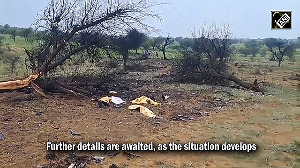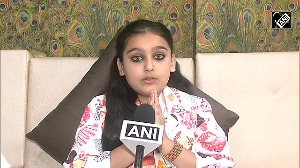'Those giving voice to the voiceless should be welcomed, not punished.'
'Yes, I paid a price -- 10 years in jail -- but it wasn't only me who did so. There are many paying the price.'

Seven years after he was condemned to life imprisonment for alleged Maoist links, Delhi University Professor G N Saibaba walked out of the Nagpur Central Jail, a free man. The release should have come more than a year earlier -- in October 2022, Dr Saibaba had been discharged by the Nagpur bench of the Bombay high court because of a procedural lapse: The sanction necessary to prosecute him under UAPA had been obtained after his trial had started. Yet, the Supreme Court, in an extraordinarily urgent hearing, stayed that discharge.
This time, Dr Saibaba and his fellow accused were acquitted on merits.
Denied bail or parole even when his mother was dying, seven years in the harsh environment of the Anda cell have aggravated DR Saibaba's multiple ailments. In between medical check ups, the 57-year-old 90% disabled professor spoke from his hospital room to Jyoti Punwani about his time in prison, his longing to get back to teaching and why he has no regrets for the human rights activism that led to his imprisonment.
Welcome back to freedom. Have you got used to being a free man?
Thanks a lot for your warm welcome. I needed it badly from you and all media persons, and I received it too.
But I have not yet been able to feel the freedom I have got. The Anda cell haunts me even today.
How have you spent your first week outside prison?
A number of friends who have been supporting me and my family, visited me, apart from media persons. The warm emotions of my friends and colleagues are like a breath of fresh air.
Students I had taught 10 years back welcomed me and hugged me. Besides this, students from different universities have also been helping in every aspect.
All this has helped me slowly recapture the feeling of freedom, though I have not yet come to feel it fully.
I have also been visiting doctors for medical treatment which has been completely neglected in these 7 years.
With all this, I've had no time to talk intimately with Vasantha and my daughter Manjeera so far!
Had you expected the conviction?
No. I was very confident that the fabrication of the case would be very evident. Even the lawyers never believed there could be a conviction.

The judgment convicting all of you specifically mentions you, saying that life imprisonment was not 'a sufficient punishment' for you but the court's 'hands were tied' because that was the maximum punishment provided under the law.
(Laughs) In the first order discharging me (October 2022), the judges expressed their disapproval of this remark and said that it was unwarranted, and may result in rendering the judgment 'vulnerable to the charge of lack of dispassionate objectivity'.
That trial court judge also said that he was punishing us for all the 'Naxalite violence' that has stopped 'development' in Gadchiroli ever since it was carved out as a district in 1980. The accused must pay the price for this, he said.
In 1980, I was in school! Apart from Prashant Rahi, the rest of my co-accused may not even have been born!
Even an ordinary man reading the judgment would realise that it was not according to law. Still, none of us were granted bail, not even on medical grounds.
Bail was rejected on extraneous conditions, like the prosecution's fabricated claim that certain organisations had supported me in the case. This reason can hardly be a valid reason for denying bail.
When I applied for parole to see my mother when she was terminally ill, the prison authorities informed the court that my younger brother -- with whom I would have stayed -- could not control me. Though this is irrational and irrelevant, the courts conveniently believed them.
Why do you think they were so harsh with you? Was it your ideology? Or was it because you fought for your rights as a prisoner?
The harsh treatment was part of the instructions they were given by higher ups. They wanted to create an image of me as a devil and terrorise people inside the prison and outside.
They particularly wanted to justify my wrongful arrest and incarceration by painting me as a dreaded terrorist.

How did they describe you to the other prisoners?
They would tell the inmates and even the guards that I was a dreaded Naxalite, a top Naxalite leader, that I would change their brains. Also that they would have to face consequences if they talked to me.
Did this work?
(laughs) The moment they finished telling them all this, the inmates would come and recount this to me, and we'd laugh. Some of the guards too used to tell me this.
So not all the prison staff was harsh towards you?
Not at all. Most of the officers and guards, within a few months of my entry, understood my case and me as an individual. Despite instructions to treat me brutally, a softer relationship of understanding developed. Most guards were very helpful, and some even preferred to sit and talk with me.
Depending on the interactions between me and the guards and inmates, the image they had of Naxalites changed.
My inmates in the Anda cell loved me and were helpful in every aspect. Some of them used to take me in my wheelchair in the corridor for a ride everyday. I taught English and other subjects to many of them, who eventually could graduate through IGNOU.

Were all jailors equally cruel?
Some jailors were particularly deployed to trouble me; some were naturally negative towards all prisoners.
But in the last two years, those appointed as jailors were better educated and more aware. They were completely different from the older ones. They were very friendly, well-informed. They understood what kind of people they were interacting with.
Their awareness came from their own education, it's not as if the Maharashtra government gave them any human rights training!
These were young people who perhaps had not aimed at becoming jailors, but landed up doing this job.
However, at the same time, the constant pressure from above pushed me into harsher and crueler conditions. The 19th century colonial prison which is not at all amenable for anyone, particularly for disabled persons, also contributed to making the conditions inhuman for me. Whatever little the prison authorities could do to change these conditions was not allowed by the higher ups.
You see, life in the Anda cell is so difficult that it is used as a punishment cell. Anyone who's seen to be breaking prison rules gets sent there.
What was the most difficult thing for you in jail?
The Covid period when all contact was severed. Letters were stopped, mulakaats stopped, newspapers stopped. It became very hard when Vasantha's letters stopped reaching me.
You went on hunger strikes in jail. That must have been really difficult.
Many times the jailors deliberately created hurdles in accepting medicines and other essential items brought by my family or advocates. Sometimes, arbitrary restrictions were imposed like, I should not talk to Vasantha in our mother tongue (Telugu) but only in Hindi.
When I saw no other way to get certain rights not only for me but for all inmates, I went on hunger strikes.
Normally, nobody cares if a prisoner goes on a hunger strike, even if he dies. But I had an advantage: Vasantha. She was always fighting for my rights and informing the media. So, I had people who could raise my voice outside.
Through my hunger strikes, I could achieve many small things, which have a big impact on life inside prison.
For instance, the authorities didn't care to post the letters we wrote to our families immediately. After my hunger strike, these were posted within 24 hours.
Similarly, the letters we received were kept with them as long as they wanted. I demanded that they be delivered within 24 hours from the time they landed at the jail gate. This was done.
During the COVID-19 lockdown, we were allowed one phone call for five minutes twice a month. I demanded that we be allowed two calls a week, one each for our families and lawyers.
This was implemented in jails all over Maharashtra within a month.
The authorities were not giving books to anyone, even though I had been allowed to get them. After my strike, they were allowed for all.
The thing is, whenever I went on a hunger strike, I stopped all my life-saving drugs too. That made them panicky. They allowed me to talk to the DIG Prisons through video-conferencing and many demands got implemented.
Of course, there is no guarantee that they will continue to be implemented unless one constantly raises one's voice. But to do so, prisoners must have solid support from outside. My advantage was that I had been part of the democratic rights movement for long, so the press knew about me and my family took up my demands.
Some of us who have come out of the trauma of long incarceration must take this up. Prisoners must be treated as human beings, not as animals. Doing that is harmful not just for the prisoner, but even for society.
How you treat prisoners is a reflection on society. The dehumanisation of prisoners is the dehumanisation of all human beings.
By now you must be qualified to write a jail manual! What is your opinion of the existing Maharashtra Jail Manual?
The Maharashtra Jail Manual 1979 is completely outdated. It contains mostly what was there in British times. It's a combination of manuals of four major regions which were incorporated into Maharashtra state. Nothing in it fits in with modern concepts.
Even today, corporal punishment is allowed. Prison authorities can resort to 'mild' physical punishment, says the manual. In actual terms, 'mild' translates into heinous torture. This provision goes against the fundamental tenets of the Constitution.
Only in Maharashtra prisons there is the rule that all undertrials charged with murder must wear the uniform that convicts wear. The same rule applies to what they call 'Naxal prisoners', a separate category that exists only in Maharashtra. Most of these undertrials may have nothing to do with Naxalite activities. But not only must they wear convict uniforms, they must also wear a green band around their wrists.
Other states have changed prison rules, not so Maharashtra.
Recently, some ministers in Maharashtra who have been in jail for long periods, have spoken about the conditions inside after coming out. I hope their complaints make a difference.
You suffered so many deprivations; even a water bottle was denied. How did you cope? You never gave up.
My work as a democratic rights activist made me understand that you have to have patience and tolerance, and raise the same question again and again. I have been raising the same questions and demands for the last 35 years, and they still haven't been fulfilled.
So though my body didn't cooperate with me, I could face all the sufferings because of my will power. Human rights defenders live on undying aspirations and hope.

I must ask you the same question that I did when you were out on bail in 2015. Do you regret standing up for human rights, for which you had to pay such a heavy price?
No. What else can be done if you want to fight for the rights of the people? What I've done is legitimate work. And I've only done it after fulfilling my duties as a teacher.
Democratic rights work, raising fundamental questions about our society, is very much required for society. In fact, not just a few, but a large number of people who have the opportunity to do so should do it. Otherwise how does society progress?
Look into history. Any society which has progressed has done so because of the activism of the educated and those who have an advantage which enables them to raise issues of people who are not heard. Doing so doesn't go against the Constitution.
Those giving voice to the voiceless should be welcomed, not punished. It's in the State's advantage to address these issues.
Yes, I paid a price -- 10 years in jail -- but it wasn't only me who did so. There are many paying the price.
We are going through a phase in our society in which people have to pay a heavy price for standing up for people's rights.
Do you want to go back to teaching, or you are in no condition to do so?
I want my job back. I want very much to teach. My medical treatment will help me get better, but if I start teaching, I know I will get very much better.
Feature Presentation: Aslam Hunani/Rediff.com











